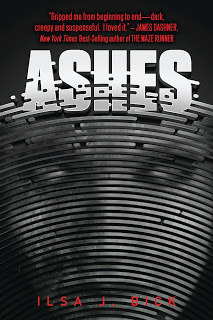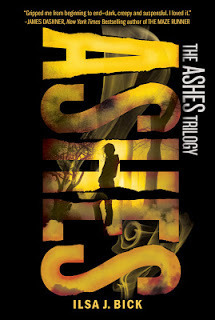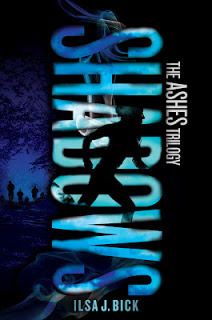Ilsa J. Bick's Blog, page 32
May 27, 2012
Enjoying the Ride
If you’ve been out of town or off-grid for the last few days, then you probably missed hearing about Neil Gaiman’s commencement address to graduates of the University of the Arts. Even if you’ve heard about and/or listened, it’s a speech well worth listening to again. So, go ahead; I’ll wait.
Now, there’s a lot in this particular speech worth focusing on, especially the stuff about making your own rules. On the other hand, I’ll be honest: I did that way back. Figured out which rules I could break and the ones I had to stick to, and then acted accordingly. Would I have gotten further faster if I’d stuck to the rules back then? Again, being honest? The answer is no. I did stuff you weren’t supposed to, but I’d gone by the rules for a while, gotten nowhere, and decided I couldn’t be doing any worse , so . . . why not?
Of course, it also might have been that what I’d actually written before wasn’t what it needed to be to break in. But I don’t necessarily believe that either because I’d been playing by the rules with stuff that kept being routinely rejected–but which got accepted, pretty much right away, once I decided to break the rules.
But that’s not actually what I’m writing about today. Nor do I agree with every single one of Gaiman’s points because, honestly, you really DO need to a) be a pro, b) be on time and c) be turning in good stuff. I don’t know anyone at this stage of the game who can be an absolute schmuck and yet be so totally brilliant that everyone just puts up with it . . . but then again, I don’t move in the same circles as Gaiman and King and anyone else who’s a mega-bestseller.
No, the part of Gaiman’s address that I breezed right past–but which was, for me, the most important part–and something I still need to focus on is that whole enjoyment thing. It’s really fascinating that while I heard it, I didn’t “hear” it and it took a friend to point out to me what I’d missed. That’s because he knows me, very well, and I’d just been stressing about everything I needed to get done in x-amount of time. He knew what he was hearing and how to rein me in.
Ask anyone who knows me, and they’ll tell you: I’m a glass half-empty girl. Nothing’s ever quite good enough nor do I believe that anything good–except my husband–lasts (and there are days when I wonder how much longer he’ll put up with me). Call it a Freudian thing, or a result of being a kid whose dad was in a coupla different concentration camps, but I just don’t trust that good things won’t evaporate. I guess you could say that I’m not a look-on-the-bright-side kind of gal.
I tend to stress. I tend to do exactly what Gaiman talks about. I am ALWAYS thinking ahead to the next day, the next book, the next project, when I just MUST get a new book out there . . . all that stuff. Any enjoyment–even the accomplishment of FINISHING A BOOK (which is HUGE, guys, HUGE)–only lasts for a small span before I get restless, need to move on, have to edit. That kind of thing.
Now this type of restlessness is very good for, say, a medical student. An intern. A doctor, who’s always leapfrogging ahead, thinking down the road, trying to figure out what might help someone in distress. In psychiatry, you’re always in multiple times at once: in the moment with your patient; in their past, trying to tie what you’re hearing to what’s come up before; and in the patient’s future, thinking about you might do or suggest that will help down the road.
But in terms of actually ENJOYING the moment–the fact that I’m holding a book I wrote in my hand?
Well, I do . . . and I don’t.
I remember when all I wanted was to publish a short story. Then, it was I’d like to keep on publishing short stories. Then, it was holding a book I’d written in my hand. Then, breaking out of work for hire and into seeing my own stuff in print. Then . . . You get the picture. It’s very Roseanne Rosanneadanna: always something.
I also think that I breezed past that part of Gaiman’s address because I must have some fantasy of what making it to that point entails. Unlike Gaiman, I don’t have long signing lines and all that; I’m not a tenth of the way to where he was when Stephen King gave him that advice. Putting aside the fact that if Stephen King liked ANYTHING I’d written and told me so and then gave me advice, TOO, I’d probably have a heart attack . . . I think that Gaiman’s inability to take the advice points up a fundamental insecurity we writers have–and, maybe, always should.
A friend of mine makes distinctions between an author and a writer. Authors live in Author-Land, a lovely alternative universe where they rest on accolades, hob-nob with influential people, are quite fun at parties, tell super stories–but don’t write a darn thing, or–if they do–not a lot or very good anymore. They live on what they’ve done. Think . . . Truman Capote, J.D. Salinger, Ernest Hemingway, William Faulkner . . . or any writer who’s effectively stopped writing but still has THE NAME.
Then, there are writers: people who grind it out, like golfers, every day. They do the work. They produce. They’re in the trenches.
The thing is, I think Gaiman was being a writer: someone who had to look ahead to the next book, the next paycheck, the next series . . . whatever. I think that, if he’s honest, Stephen King was and might still be that kind of writer, too: a man who could live on Author Island but has both the drive and the inability to stop writing. Both are successful precisely because they never could NOT look ahead to the next project. Oh, and yeah, they write well.
But you understand what I’m saying. Most of us will always be only as good as the next book, which means that being in the moment and enjoying the ride take as much work as . . . well . . . the work. For me, there’s the flip-side, too: when the writing is going well, I BLOODY LOVE IT. There is NOTHING in the universe I’d rather do–and then I am enjoying the ride.
So, maybe, enjoying the ride is about enjoying the process of writing: the craft, the discovery, the desire to push oneself just a little harder, try something just a little different. Failing sucks, no question. But when you succeed–when you KNOW you nailed it–there’s nothing finer. What’s even better is when you get to share this with other people; when you entertain them with the world you’ve created. Enjoying THAT ride is just as important.
I think the take-home here is figuring out what “the ride” is and means to you, and understanding that the ride may change over time as you mature as a writer and go further along in your career. Recognize that enjoying the ride may mean something as profound as holding a bestseller YOU WROTE in your hand or allowing your SO to drag you to a movie because you’ve put in a hard day, sweating over that keyboard.
So, be flexible. Enjoy. And, remember: it’s never a bad day when there’s cake.

May 13, 2012
The Loneliness of the Long-Distance Writer
When my husband wants to drive me crazy, he reminds me that computers don’t live in our world. Instead, we live in theirs. I balk at that, but then I remember the irony of that last scene in The Social Network where Zuckerberg’s sitting at that computer, obsessively refreshing the screen every few seconds. Here, the invention of this social network has both made him rich and profoundly isolated him, costing him his only friend. The best he manage now is to hope that a girl he’s never met will accept his invitation to “friend” him.
Which is pretty sad, when you stop to think about it.
I was reminded of all this when I ran across an article in the May issue of The Atlantic all about social networking and Facebook and the web of interconnectivity in which we all seem to be snared either by choice or design. The upshot of the article, though, was intriguing: all the research would suggest that, despite our being so very electronically connected, we’re actually lonelier and more self-involved than ever.
This is fascinating–and yet makes perfect sense. Think about the number of times you’ve seen people in restaurants or on the train or in an airport or a waiting room and what are they doing? Everyone’s playing on their devices: answering email, surfing the Web . . . you know the drill. Sure, some people are reading and, yes, this is a solitary activity but one which I believe is profoundly different than clicking and surfing, bopping around, hoping to find something “interesting.” Particularly weird are the couples sitting right across the table from one another and not speaking much at all but playing with their devices. When they do manage a conversation, it’s fitful at best and broken by cell phone calls and email checks. (Why people feel the need to answer a cell when they’re at the table to begin with is lost on me. This is why there’s voice mail. But the sense that you just MUST answer the phone call is profoundly narcissist, if you ask me. NO ONE is really that important; barring life or death, nothing is so earth-shattering that it can’t wait for a half hour. You just are not THAT important.)
But I don’t want this post to degenerate into a diatribe against social networking or interconnectivity. I mean, I AM blogging, for God’s sake; I’m on Twitter and Facebook. But I wasn’t initially there by choice, and here’s why.
I am profoundly shy. Really. I know. This always surprises people who meet and/or know me in person. But I really am. (Hey, we shrinks don’t go into shrinkdom simply to do good in the world; we frequently want to understand ourselves.) In my mind, you guys are always much better looking, better spoken, more at ease than I can ever be. My husband knows that when I absolutely MUST go to some social event that revolves around his work, we follow this fairly predictable pattern. He tells me about the event; I ask if I really have to go; he says yes; I ask why; we have anything from a minor scuffle to a modest brawl; I give in and say, fine, okay, I’ll do it, FINE. Then I flounce around for awhile and, on the way into the event, I always turn to him and suggest that he do all the talking while I listen and . . . oh, by the way, when are we leaving? Is it time to leave yet?
So, yes. Shy. I’m not going to go into all the gory detail or anything about adolescence or medical school or dating–(although if you recall your Joseph Conrad, it really was a bit of the horror, the horror)–but suffice to say that, as with Sherlock Holmes, if there’s a wall or suitable piece of drapery, I’m likely to be wearing clothing most likely to double as suitable camouflage.
Now, after years of practice–forcing myself into forensics and drama and all that, where I HAD to go out there and be in front of other people and say SOMETHING (even if scripted)– I’m much better; I function fine in social situations; no one would ever know that I was the very definition of a wallflower. The downside of being shy, of course, is that you also tend to be somewhat lonely and envious all at the same time. You stand there and watch everyone else having a good time at the dance or party or whatever, and it’s just . . . depressing.
This all ran through my mind as I read this article because I started thinking about what social networking has been like for me, both personally and as an writer. When I started out, I didn’t do any of these social media things; I didn’t have a blog. I was pretty much told by my editors that I MUST have a web presence; MUST be on Twitter; MUST be on Facebook. For a shy person, this was a very tall order; just because I couldn’t see you didn’t mean that I wasn’t tongue-tied. What could I possibly have to share or say that would interest anyone if it wasn’t connected to a story (or, better yet, the story itself)?
As a writer, I’ve been kind of surprised. The problem for a lot of writers is that even if our minds are full, our work is very solitary. (As Annie Dillard once put it, writers don’t write books so much as sit up with them, a tad like holding the hand of a dying friend and hoping that, somehow, it will all get better eventually.) But it is a solitude I embrace; I like hanging out in my head. Most of the time, I really don’t mind being alone; it’s the life I’ve chosen.
Yet while maintaining a regular Web presence has taken some getting used to, there have been a lot of upsides to being connected. I’ll give you one example. I was in the middle of touring last year and I missed a connection or something . . . I forget the exact circumstances. But I’m stranded in the airport and stressing, so I tweeted about it. I’m not even sure why I did that. But within about five minutes, someone had tweeted back, expressed their sympathy, said some nice things . . . and then spent, maybe, ten minutes or so going back and forth with me on Twitter, just keeping me company, offering encouragement . . . stuff like that. In that instance, I was grateful to have someone to talk to for a few minutes, just to get my frustrations off my chest and have someone feel a little sorry for me (because I was feeling plenty sorry for myself). For that brief period of time, I wasn’t . . . well . . . alone or lonely.
So, for me, that’s an instance where social networking was a nice thing to have. The connection wasn’t DEEP or anything; it was a lovely example of another human being reaching out to assure me that I wasn’t alone and everything would be okay. I’ve since discovered that it’s kind of nice to drop in, chat a bit, drop out again . . .
And yet, I’m also bothered by this because I can see where some people might mistake this kind of fleeting contact as a true connection, which I’m not sure that it really is. Don’t get me wrong; I’m grateful there are people out there with whom I’ve grown kind of chummy via email and Twitter and what-have-you. A couple have reached out to see if we can actually meet–which would be fun–and I LOVE how social media have allowed me to connect with other writers and, most especially, my readers. I LOVE hearing from folks who’ve enjoyed my work; I love chatting with kids and adults about writing; and I know of at least one kid who pursued something she normally wouldn’t have if not for Facebook, which allowed us to toss around a few ideas.
Yet I’ve also succumbed to the Zuckerberg-refresh phenomenon, too: tweeting or Facebooking about something only to then obsessively return again and again to see if anyone–ANYONE–cares. (It’s a little bit like that tree-falling-in-the-forest kind of thing.)
And here’s what I’ve found: THAT’S when I feel loneliest, when I keep (re)discovering that there’s no one out there. In those instances, I let the social media dictate how I act and, subsequently, feel. It’s not the loneliness of writing that leads me to do this; it’s the reinforcement of what we all dread: that we’re really only important to a very few people–or, even worse–not important to anyone, at all.
What I’ve also discovered about myself is that I tend to do this when I’m having a horrible time maneuvering around some annoying plot point or the story’s not cooperating or I can’t seem to move the chess pieces in the right way or order and the work’s not going well. THAT’S when I tend to start tossing out bon mots and obsessively checking and rechecking email and Facebook and Twitter, hoping for a response, a bit like throwing out chum to lure sharks. Of course, everyone else is going on with their lives; it’s not like I’ve picked up the phone and asked a friend to meet me for coffee or something; and so the non-response can make me feel even worse. In those moments, I do feel as if I’ve crossed into the machine’s world instead of remaining firmly fixed in mine and empowered to act rather than depend on random bits of electrons. I’ve gone searching for a fleeting and ephemeral connection which is no connection at all, and nothing compared to the satisfaction of simply going out and being in the world.
I’d be interested in what other folks–readers and writers–think about this. Have you guys noticed that your use of social media goes up when you’re frustrated, feeling blue? Do things like Facebook and Twitter help? Hurt? Make you feel better or worse? Or are they ways of tricking yourself into thinking that what you’re doing is REALLY important when all you’re really doing is avoiding something else, like work? And are we lonelier than before? More narcissistic and dissatisfied? Because, really, having thirteen trillion followers . . . that doesn’t make us any less lonely or alone.
Does it?
April 29, 2012
Sticks and Stones . . . and the Kobayashi Maru
News flash: All of life revolves around Star Trek. Everything you ever needed to learn, you can learn from that show, and this is nowhere more self-evident than the (in)famous Kobayashi Maru scenario. For all you neophytes, let me briefly summarize: the Kobayashi Maru is a Starfleet computer simulation all cadets must take. The explicit objective is pretty straightforward: the Kobayashi Maru has somehow bumbled its way deep into the Klingon neutral zone and become stranded. If you do nothing, the crew’s so much Klingon gagh (blood worms), which–trust me–is pretty disgusting, no matter if you prefer those squiggly things alive (how real Klingons show they have hair on their chest) or not.
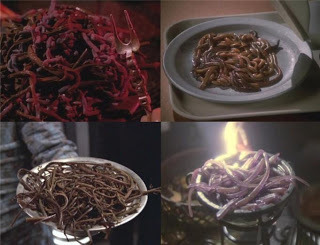
Do something–cross the border and try and rescue the ship–and not only have you now violated the Organian Peace Treaty (don’t ask), but you’re also hopelessly outnumbered and soon to become one more plasma smear.
The Kobayashi Maru is the classic no-win scenario. Natch, it goes without saying that James T. Kirk beat it, but he cheated. So you can debate whether that really counts. Distilled to its essence, however, the Kobayashi Maru is a test of character.
We writers also have our peculiar Kobayashi Marus. They’re called reviews.
Now, every adult knows you can’t please everybody all the time. But we’d like to think that we can just as I think we might also like to pretend that reviews don’t matter.
Case in point: I once heard this crazy-famous writer give a talk, and someone asked if he ever read reviews. Now, this crazy-famous writer’s newest book had just come out a bare five minutes before this particular conference, and so I wagered that he, like everyone remotely human, would be interested in hearing how people reacted to what he’d written. Well, he said he never looked at reviews because he just didn’t need to–and, ooohhh-kay, I thought that was pretty flat-out, shut-mah-mouth amazing. I mean, we’re talking some serious willpower here. This guy was so sure of himself, his place in the universe, that I bet he was a Klingon in another life.
But I also thought he might be lying, and here’s why. The guy’s crazy-famous. He might pretend to be a Klingon, but we all know he’s human and you’re telling me he NEVER reads one of those fab reviews? You expect me to believe his editor NEVER shoots him a review from PW or Kirkus or what-have-you? Look, I’m not even a gazillionth as crazy-famous, and when my editor sends a review, I read it. (And, sometimes, yeah, I wish I hadn’t. Like, wow, life is hard enough and now I’m all depressed. Like, wow, thanks a lot; I really needed that; am I bleeding?)
Anyway, as it turns out, I was right. That crazy-famous guy lied, and you know how I know? Because: I happened to stroll past the Amazon site that day to check out his newest, and I saw this one review that completely trashed the book. Utterly and totally. Just ripped that sucker to shreds. And here’s the kicker: I know this famous guy read the same review because he tweeted about it, talking about some Amazon meanie. Of course, all his fans jumped in to make him feel better–it was a fascinating feed to follow for awhile–and I’m sure that’s why he tweeted it in the first place. (I’m not condemning him, by the way. That’s what friends are for.)
But you do have to ask yourself: why did this crazy-famous guy lie, and about something so trivial?
I don’t have a clue, so don’t ask me. Yet this does bring up an interesting point about reviews, in general.
First question: Do they matter? (Come on, you all know the answer to this one.) So, second question: How much do they matter? Well, we all know the answer to that one, too. It depends–and oh, isn’t that a loaded word? What makes one opinon more valuable than another? Because more people agree? Because the opinion is based on observable data and facts? (For example, we might all agree that a book with horrible grammar and terrible spelling just can’t be good . . . but then we’d have to diss Huckleberry Finn. In that instance, of course, the story is so damn good, and we all know it. Sort of like pornography, I guess . . . )
My take–the one I spout when I’m not bleeding from some scatching snipe–is that a review is nothing more than a private opinion made public. Now, as in all of life, some opinions mean more than others. Some carry a lot of weight. (And, no, for the record, while I love my mother, her opinion carries no weight at all. She’s my mother, and people who love you lie. Ditto for my husband. On the other hand, since he’s read absolutely nothing I’ve written in the last ten years except a few short stories–and, yes, he said he loved them, but he might be lying–he doesn’t have to worry about lying at all. As for why he doesn’t read what I write, it’s simple: he’s worried that if he says something nice, I won’t believe him, and if he criticizes the story, I’ll cry. Honest to God. For him, offering an opinion is the spousal equivalent of the Kobayashi Maru.)
The problem for writers is . . . what do you do about reviews? Do you read them? Do you search them out? A very wise pro writer friend once told me that I should never search out reviews because the ones that are the most bruising are the ones I’ll remember. He thought that review-trawling ought to be left to someone else: my husband, a friend, my editor. (He and his wife, both writers, cull reviews for one another.) Great advice, if you can take it or have the luxury of someone who will do that for you. Editors are busy people, though; they’ll send you the biggies–PW, Kirkus, Booklist, maybe one or two others–and the rest, they leave out. Which I think is a shame because I’ve read some very perceptive reviews by readers and fans, some of which find things in books I never realized I’d done but were obvious once they pointed them out.
The problem with searching for reviews is you’re going to read some real stinkers. Some people are just flat-out mean. Others are vicious. A great many are even-handed; the book just didn’t work for them, and those you can live with a lot easier than the ones which have decided that you’re clearly disturbed and in need of psychiatric help. (Swear to God, that’s what one person thought of a Mechwarrior book. Blasted me all over Amazon. It was ugly, mean, really going for that jugular. Now, I could’ve been a very understanding shrink and decided that, whoa, guess my book touched some nerve. Because, honestly, if people rant and foam and decide you’re some sort of pervert . . . well, that says a little something about them, doesn’t it? But I’m only human, and that review really got to me. Fortunately, it got to a bunch of other people, too, who complained to Amazon that the post was a personal attack and got it removed.)
But reviews–ones that trash your work–are attacks. There’s no other way to put it. Some are just a little more civilized than others, a nice jab with that épée rather than a saber slash or mace bash. Make no mistake, though: the reviewer is savaging your work, sometimes nicely and sometimes not. A reviewer with her eye on her audience is more likely to get in those withering bon mots than not–because a review is also a form of entertainment of which a reviewer, like any writer, is always mindful. Think what a bore Maureen Dowd or the late Molly Ivins would be/have been without a touch of that old zingy venom.
So the question remains: what to do? I’ll be honest; I go back and forth. On the one hand, I really want to know. Being told that I’ve done well is just so primal, you know? It’s like running to your mom with a picture you’ve drawn, or screeching at your dad to lookit, lookit as you pirouette in your sparkly pink tutu.
But, on the other, bad reviews are the equivalent of those zits your mother told you to keep your fingers off of, only you never could because they were just begging to be squeezed and there was something about destroying those suckers, that satisfying little pop. Come on, you know what I’m talking about; I’ll bet you stood at the mirror for hours searching out those blackheads and zits until your face looked like you’d gotten carjacked and drug about five miles over gravel. I know . . . as appetizing to think about as gagh.)
In the end, I guess it just depends–on what you can tolerate; how much damage good or bad reviews will do (because good reviews can be just as deleterious if they shake you up enough to wonder just what the hell you did right because you sure don’t know); how much satisfaction you get out of the rest of your life; if there’s someone there to hold you when you get the zingers; if you’re self-destructive (think squeezing zits until you bleed); if you can decide whose opinion really matters; and if you can roll with the punches. Yeah, I know: the trouble with punches is you never know if you can roll until you get hit. But if you don’t bounce back well after a couple . . . maybe best to rethink that strategy and not end up in those no-win scenarios. Because, as we all know, for the valiant and doomed crew of the Kobayashi Maru?
So sucks to be you.
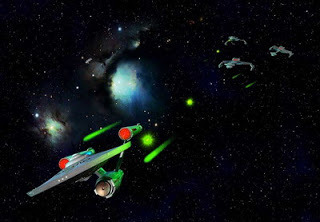
April 18, 2012
Bulletin for the Center for Children’s Books recommends DROWNING INSTINCT
And a lovely review, it is. Gotta love that last line:
Bick, Ilsa J. Drowning Instinct. Carolrhoda Lab, 2012 343p Trade ed. ISBN 978-0-7613-7752-8 17.95 E-book ed. ISBN 978-0-7613-8726-8 12.95 R Gr. 9-12
When the policeman asks Jenna how she fell through the ice and nearly drowned in the lake near her teacher’s house, she won’t tell him. When he leaves her a recorder, though, she starts talking, describing her memories of nearly dying in a fire at her grandfather’s house when she was young, her parents’ on-again off-again romantic closeness, her father’s brutally controlling behavior, her difficulty fitting in at her new school, her longing for her absent brother, and finally her relationship with her teacher, Mr. Anderson. The tale that emerges has numerous heroes and villains, but they are often contained within the same person, and the moral messiness disallows easy distinctions. At the center of it all is Jenna herself, whose keen need for love is met only by people who betray, neglect, and lie to her, even when they, too, are simply seeking genuine affection. Jenna’s narration spins out multiple mysteries and consistently dares her imaginary listener to condemn her romantic relationship with her teacher, who matches her need for need. In fact, her defiant tone and refusal to be a victim even though she has been victimized is what ultimately keeps her afloat, making this a compelling study of brokenness that persists across generations and of salvation by unconventional means. KC
April 15, 2012
The Undiscovered Country of Our Imaginings
You remember Hamlet, right? That “to be or not to be” soliloquy? Or maybe you’re most familiar with its incarnation as the subtitle for Star Trek VI: The Undiscovered Country, where the evil Klingon General Chang, played with giddy abandon by Christopher Plummer, regales the Enterprise crew with more Shakespeare per frame than any previous Trek film–because, as we all know, Shakespeare was Klingon. (Don’t get me started on the franchise’s canny appropriation of classical and popular literature, by the way, or we’ll be here all day.) The fact that Chang’s trying to reduce the ship to a plasma smear while channeling Marc Anthony only makes this even more enjoyable to watch.
Chang doesn’t succeed (of course), and at film’s end, the crew sets course for the second star to the right and straight on till morning, warping off into the future of a metaphorical Never Never Land where they never grow old and I’ll be able to revisit them, as they were, whenever I want.
Chang’s point–and Shakespeare’s–is that death is the ultimate undiscovered country, one from which no advance scouts return to fill us in on what’s going to happen next. in the context of the film, though, Chancellor Gorkon (David Warner) offers a toast where the quote’s meant to highlight uncertainty: peace between the Federation and the Klingon Empire’s never been achieved; some fear that future and others embrace the unknown.
I was reminded of this during the past week when I settled down to revise and edit a new book, THE SIN EATER’S CONFESSION (Carolrhoda Lab), slated to come out next February. I confess: I wasn’t too keen to work on the novel just yet. See, I was deep into (and in love with) a new novel I was all hot and bothered to finish before a drop-dead date when I knew/know that I must stop and begin the last ASHES book. But my editor’s wish is my command, so I put aside my new novel and cracked open a book I hadn’t seen or thought about in three years–the longest time I’ve ever been away from a book in my life.
What an experience.
When I edit, I tend to work as I go along: re-reading, tidying, deciding if I agree with an editor’s comments or edits. After all, I’ve reasoned, it’s not like I haven’t just spent what feels like eons getting to know and care about my characters. I know what happens when and to whom; I can typically find a particular passage or scene without breaking a sweat. Sure, sometimes I rewrite massive sections or add scenes, or divide chapters differently to correct for pacing issues. I see things after a book’s marinated that I haven’t before. That’s pretty standard for every writer, I’ll bet. But the changes are never so stunning or major I didn’t see or imagine them coming a mile away. (In fact, I frequently have. They turn out to be scenes I’ve edited out but then reintroduce because, you know, they really DID work that first time around.)
This book was different. Clearly, as the writer, I knew what the book was about. I even kind of remembered the basic order of what happened when. But I didn’t remember the scenes so much, who said what when and to whom. Ask me to go to such and such a scene, and it was, like, say, wuh?
At first, I was appalled by my book. There were ENORMOUS pacing issues and big swaths of chunky, clunky writing that sort of hit me in the face. Like, whoa, I wrote THAT? I’ll tell you what’s also interesting; many of those things slid by my editor. Not that he did a crummy job or anything: he’s a fabulous editor. But my guess is that he saw this book at a different point in his life, too–a couple years ago. (We’ve both changed.)
I can also tell where he fell into the hole in the page, too. There was much more in the way of mark-up early on in the manuscript. By the time he got about a quarter of the way through, the writing had tightened up; the pacing got better; my characters had found themselves and their voices; the plot had legs; and–honestly–I think he got swept away by the story.
The same thing happened to me. I was rewriting massive chunks of this thing, pages and pages and pages. There were scenes I cut out, others I tightened, new passages and paragraphs and scenes I penned from scratch. I was all over that thing like ticks on a ginger mutt.
But then, as I got into the book more deeply, a funny thing happened. I still worked just as hard; in some ways, it felt like I was writing a new book. But I must’ve accessed the book I’d already stored in my brain, too: not a book graveyard but the undiscovered country where memory lives until we need it. I’d finally fallen back into, and in love with, my book. The words were my character’s words, not mine; I wasn’t turning over so many rocks to find them. The freaky thing: there were times when I’d write something down, only to discover that I’d written the same thing–in many cases, verbatim–a few pages further on. Already. Three years ago.
So, it was a fascinating experience. Here I am, further along in my career and a different writer than I was when I began–and yet the characters, exiled to the done-book graveyard, are there, the associative connections still active such that when I access those memories and their stories, they think and behave in nearly the identical way they did before. They come to the same ends; they’re helpless to alter their paths because I made them that way. They can’t do anything but follow those same paths unless I radically re-imagine them and write a wholly different book. In a way, these characters came back from the grave.
Which also reminds me of the opposite and something my very dear friend and mentor, Dean Wesley Smith, once said: when a book fails, don’t try to fix it. Kill it. For good and forever. I know: radical. Hurts like hell, too, because you really think that book deserves to live. If you kill it, you’ll have nothing to show for all that work and sweat and blood and tears.
But that’s not true. What you have to show for failure is experience. Judgment. You know enough to know when something truly stinks. Think about people you’ve read who don’t–and how many books you’ve thrown across the room.
So, kill the characters. Kill everything about that book because there is nothing you can do to alter the fact of its failure. Your characters will follow their predetermined paths to that same end, just as mine did even three years after they were born. They can’t help it, and neither can you.
The only thing a writer can do is reinvent, quite a different thing. Reinvention is the engine whereby your characters head into a truly undiscovered future, one where their story may not fail, because you haven’t imagined it yet.
No need to do so with this one, thank heavens. THE SIN EATER’S CONFESSION is fine as it stands–and better now that I’ve found it again. All it was really waiting for was me to rediscover what I’d already known.
April 10, 2012
March 2012 Recommended Reads, Listens and Looks
What? I was busy, okay? Writing and then the SHADOWS and ASHES cover reveals. Give me a break. Anyway, better late than never:
READS
Anthony, Lawrence; Babylon's Ark: The Incredible Wartime Rescue of the Baghdad Zoo. (St. Martin's Griffin; 2008). Conservationist and Earth Organization founder Lawrence Anthony died in March at the age of 61. An insurance and real estate exec turned animal saviour, Anthony came to world attention in 2003 when, alarmed about what might be happening to the capital city's zoo animals, he rushed to Iraq shortly after the American invasion. When he arrived, only a few weeks into the war, he discovered the zoo savaged by combat fire and ransacked by looters. The majority of the animals were gone, either killed by weapons fire, butchered by the city's inhabitants for food, or removed to be sold on the black market. Although some American soldiers tried to keep the few remaining, highly traumatized animals alive–a pride of lions, a Bengal tiger, a terrified badger that had managed to burrow itself deep into the ground, and one nearly blind bear that fought off looters–their duties lay elsewhere, and the American military had yet to understand, much less sanction, rescue operations in the middle of an ongoing conflict. Enter Anthony, a man who'd already rescued a herd of rogue wild elephants on his Zululand game reserve. Through his energy and ceaseless efforts, these animal–as well as a pride of Hussein's lions and his herd of prized Arabian horses–survived. Eventually, the US got into the act, and today, the Baghdad Zoo's been rebuilt into what is reportedly the best in the Middle East. Whatever you think about zoos, this is a worthwhile read, though not an easy one. If you aren't moved to tears by these animals' suffering, you have no heart. To read or listen to more about this remarkable man, check out the obit in the New York Times or listen to NPR's interview with Anthony's brother-in-law and co-author, Graham Spence.
Shriver, Lionel; We Need to Talk About Kevin. (Harper Perennial; 2011). I have to admit I'd been curious about this 2003 novel for some time but was a little turned off by the wallowing, the misery, and the epistolatory narrative about the lead-up to and aftermath of a school shooting, and so just never got around to it. In addition, it felt like a bit of a busman's holiday; I am a child shrink, after all, and I've seen my share of violent, troubled kids. Other books, fiction and non-fiction alike, on the same subject just haven't done it for me either. After a recent visit to the UK, however, I spotted the posters for last year's movie (which I've not seen but which stars the gifted Tilda Swinton–an absolutely fabulous choice, if you ask me) and decided to give the book another try. I will be honest: I think there are many problems with this book–pacing, for one (there are just too many sidebars documenting an exhaustive list of school shootings) and, for another, the "surprise" twist near the end (which you see coming about a third of the way into the book and so makes this a bit of a slog). Ironically and because of this slog, the reader's more than eager and ready for the "meat" of the matter by the denouement, which I'm not sure is intentional. I suppose the corollary would be sitting through Titanic, a movie I've never seen because, you know, the ship sinks and people die. I see no reason or reward in hunkering down for the spectacle–wow, lookit, the ship sinks and people die–but that is what happens in this book. More troublingly is the depiction of Kevin himself–a better candidate for the anti-Christ you'll never find–which is just too skewed by this novel's unreliable narrator.
Yet it is this mother's narration that's worth the trouble here. As a mom myself, I really could relate to a lot of her concerns and misgivings on just about everything related to the decision to have a child and her abilities as a mother. If you think that you'll gain insights into what makes these kinds of kids tick (and there's no concensus out there about what motivates school shooters), look elsewhere. On the other hand, if you don't mind thinking about the troubling questions posed here, then this is worth your time. I found that this book was best if I traded off reading with listening and vice versa. I don't know if I'll see the movie if and when it makes it over here (or to DVD)–John C. Reilly seems a very bizarre choice for the husband–but I might.
If I do, though, I worry that I might have to cave and watch Titanic. Quick, someone; stop me before it's too late.
LISTENS
Shriver, Lionel; We Need to Talk About Kevin (narrated by Coleen Marlo; Harper Audio, 2011). See my review just above, but I will say that Marlo does a fabulous job here, capturing this highly troubled and somewhat sympathetic woman's plight. As I said, I related to what she was talking about, and–really–some people shouldn't become parents. Regardless of what happens, this woman isn't . . . what the word I'm searching for . . . redeemed by her loss? Or perhaps it is that by the end of this listen (and read), you get the sense of the bizarre justice here: mother and son deserve each other.
LOOKS
Life (series creator, Rand Ravich; starring Damian Lewis, Sarah Shahi; 2008-2009) I got interested in this series after watching Lewis's work on the spectacular Showtime series, Homeland, which I reviewed in October, 2011. This delightful and tragically short-lived NBC series revolves around Zen-spouting, fruit-obsessed LAPD detective Charlie Crewes (Lewis). Sentenced to life after being convicted for murders he didn't commit, Crewes is set free after twelve years, given a HUGE settlement of 50 million in damages, and returned back to, well, life. A guy who can afford anything, from an orange grove to a solar farm, Crewes returns to the LAPD, with an agenda: to find the real killer and uncover the conspiracy that sent him to prison in the first place. No spoilers here, but he succeeds, and yet those story lines are only part of the fun here. With a very good supporting cast in Sarah Shahi, who plays Crewes's partner and recovering addict/alcoholic, Dani Reese, and Adam Arkin as embezzler and fellow convict turned personal money manager, Ted Earley, this is very nice ensemble show, without the CSI-schtick, violence or gore of other, grittier cop dramas. The strength of this series rest almost solely on Lewis's capable shoulders; he can be quirky one moment, full of menace the next, and you can see hints of the kind of haunted, fairly spooky and tortured character he perfects in Homeland.
Warriors (Gavin O'Connor, director; Lionsgate, 2011). I don't watch the WWF. I know nothing about mixed martial arts. I don't particularly care for boxing–and yet, I sat through and really enjoyed this film about two estranged brothers (played by Tom Hardy and Joel Edgerton) who end up competing in the same mixed martial arts tournament and their relationship to their alcoholic dad played with a swagger and gravelly bravado by Nick Nolte, a guy who's no stranger to this problem. Nolte has always been highly watchable and he is here, too, although one scene–no spoilers–you can see coming a gazillion miles off because the story just begs for it, and the dad is a recovering alcoholic, after all. Ditto, who ends up in the final match . . . well, I mean, it just has to be. What is fun here—and intriguing, too–is not only how and why guys might do this sort of thing to one another (atonement, money, the thrill, money, notoriety, desperation . . . and did I mention that five million dollar purse?) but how much this film got me to care about and get excited over the spectacle of guys beating the crap out of each other. This is stuff I wouldn't watch, ever. I just can't imagine what could be so entertaining about it. But this is a film about war, too, and what's worth fighting for. So I was right there, rooting for these guys, gritting my teeth and grimacing at every thrilling punch and takedown. Am I convert? Uh, that would be no. On the other hand, if you don't mind well-built guys, with some impressive six-packs and muscles on their muscles, whaling on each other and want a very nice, redemptive brother flick in the bargain, this is the movie for you.
April 2, 2012
ASHES Gets a New Look–and SHADOWS, revealed!
As I mentioned last week, yesterday Mundie Moms hosted an exclusive cover reveal for both the new ASHES paperback (coming in August) and SHADOWS (due out 9/25/12). The lead-up was great fun–lots of tweeting, FBing, excited fans–and now I get to share these covers with the whole wide world.
Be interested in what you think, too.
You remember the post I did about a month ago comparing the various treatments ASHES has gotten overseas? Well, take a peek at the old ASHES look
and now compare it to the new look ASHES will assume in paperback
I'll be honest. My first response was a Scooby-Doo uh-wuh? I'd grown very attached to my creepy-weird, gender neutral original cover. The new look felt . . . whoa, wait a second. I LIKED being creepy-weird, you know? But I DO remember that when I first that original cover, I'd been a little concerned about the lack of color. As it turned out, that was a legitimate concern. With the all-black/gray tones, the book got lost and easily overlooked. *I* missed it once because it was the last one on the shelf and, literally, in shadows/overshadowed by books on either side. So the addition of a little bit of color for that eye-pop is important from a purely grab-your-attention sense.
Most fans like the new direction. They really respond to the colors, like the air of mystery. Many, however, prefer the older, starker look. Both camps feel that each cover tells a different kind or piece of the story.
So what do you think? Does the new look speak to you? What kind of story does it promise? Are you intrigued? Indifferent? Turned off? What qualities in a cover appeal to you?/span>
March 26, 2012
SHADOWS, Revealed! . . . er . . . almost
I am cursed, and here's why.
I have this habit of falling in love with shows that last only one season or, sometimes, two. We're talking series like My Own Worst Enemy in which a deliciously diabolical Christian Slater took Jekyll and Hyde to new levels;
that last episode of Stargate Universe when everyone, except Eli, goes into hibernation for a three-year voyage which we all know will never end;
or the series finale for Stargate Atlantis which, while getting our heroes back to Earth after a five-year jaunt in the Pegasus galaxy, left them marooned and cloaked in San Francisco Bay;
or, most recently, The River, which, last time I looked, is likely headed to the cancellation graveyard with one mystery solved but the Magus's crew forever trapped in a no-exit jungle whose landscape has changed around them. (And was it just me, or did that show finally find its legs when Bruce Greenwood showed up?)
I could go on, but you get the picture. There I am, invested in a show. I care about these people. The show's dug in its claws the way all good stories do–and then it–and I–get pushed to the edge of that cliff where we're left, dangling, forever.
And ever . . .
And ever . . .
The same could be said for books that leave you gasping, hanging on by your fingernails, screaming–just like Buzz:
REM got it right. The premature end of a great show feels kinda the same (for me, anyway):
Well, ASHES fans, I'm happy to report that no such dastardly fate awaits you. Your wait is half over. SHADOWS is set to hit shelves on 9/25/12 and, to celebrate, the wonderful folks at Mundie Moms (home base for Cassandra Clare fans everywhere) are hosting a fantabulous cover reveal party on APRIL 1 (no foolin'). You'll be treated to the FIRST EVER glimpse at the new look for the series, including a peek at the cover for SHADOWS.
In this week's lead-up, I'll also be taking your questions and posing a few of my own on Twitter (@ilsajbick) and Facebook. Have ideas about a movie version? An actress you think would be the perfect Alex? Or maybe you've thought ahead and wondered just what the heck happens next? Always wanted to have a good rant at the way I left you in a lurch? Here's your chance, kiddo.
Oh, and did I mention prizes? Things like an ASHES survival pack? Signed copies of the novel? Your chance to win one of ONLY two SHADOWS ARCs up for grabs for this special event?
So, visit Mundie Moms on April 1, 2012, chat with other fans attending the reveal party, and join in the fun!
March 21, 2012
Just for Fun: Red-Tailed Hawk Cam
These red-tailed hawks have been nesting above the Cornell Athletic Field for four years now, and there are now two eggs in that nest. Watch their progress! Very cool.
Watch live streaming video from cornellhawks at livestream.com
March 19, 2012
Get Out Much?
I don't know if other writers have noticed this, but hanging out with random people–say, at an event like the bar mitzvah I attended this past weekend in Philly–is even tougher than it used to be. Sure, we can chalk a lot of this up to the fact that these are all unrelated folks, coming together for a brief period of time to schmooze, eat, and then scatter. But for me, being with normal people and making conversation was just . . . weird. It took me some time to figure out how to be around people again: you know, the niceties of chit-chat and all that. Although I'm shy, I'm not hopeless and, in the past, being a shrink was somewhat helpful because most of us are shy and/or a bit off (a little like some writers I know, in fact) and we're taught how to talk to folks to get them talking. In that kind of social situation, being a shrink's been a godsend.
This weekend, though, I felt the disconnect for a lot longer than usual. It was just something I noticed about myself. I don't think it has any deep psychological meaning to it other than a) I'm deep into my next book and would much rather have conversations with those guys and b) I spend most of my day alone and in my head, having conversations with imaginary people, who only sometimes behave themselves. But when you're carefully scripting a conversation to be read, you become accustomed to thinking of the next line and the line after that and so on. Do characters get uppity and say whatever the hell they feel like? Sure–and in this way, it's a bit like real life, but only a bit.
In real life, you have to gauge facial expressions, body posture, and all that jazz which then becomes incorporated into your work. Making the switch from all internal to a mix of the two is a challenge. I'll bet this is one of the reasons Dickens used that mirror so much, not only to become his characters–Dickens was quite the budding thespian–but to solidify this shift from external to internal.
Anyway, it was just something I noticed about myself. I do wonder if other writers feel the same.
***
The Sunday cake: in honor of St. Patrick's Day, I decided on a Guiness stout chocolate cake with semisweet ganache. I wish I'd thought to take a picture before I ladled on all that ganache (I worry it's too much, but my husband assured me that there's no such thing as too much chocolate) because I used another new bundt pan. While this cake wasn't the one I made, you can see those beautiful pleats.
Mine was similarly splendid. Winslow certainly seems to approve.

